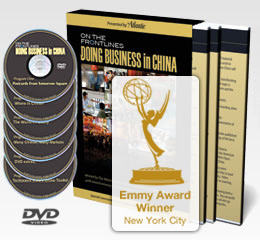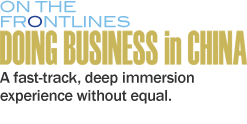FAQs
I’m a busy person. Can I really get the full benefit of ON THE FRONTLINES:
DOING BUSINESS IN CHINA?
Yes. We created it for people on the move.
First, to be practical, the disks come in thin plastic slipcases, with a bulleted summary of each. They’re easy to slip into your computer bag. More importantly, the contents are segmented into four parts, to suit your needs.
- ON THE FRONTLINES:
DOING BUSINESS IN CHINA begins with four programs on China’s business culture with James Fallows and Emily Chang, each with menu chapters. You could view all six hours on a flight to China with plenty of time to spare. (Frankly, you could probably view it all on a flight to Chicago, given the waiting time these days.)
For many people, this is all you’ll need.
But there’s more?
Lots more. If you’re going to do business in China, source materials in China or deal with Chinese businesspeople as they come to your country, you’ll want every bit of expertise. We’ve collected it in one place:
- Each of the four main programs is followed by The Business Takeaway. It’s an in-depth analysis by James Fallows and New York Times business columnist Joe Nocera, which concentrates on practical ways to apply what you’ve just seen.
- Disk Five contains DVD Extras. While these are not essential to understand business culture, such important topics as Energy, Marketing and History are expanded upon. Disk five has several different panel discussions and historical films, over three hours in total.
- Disk Six is “The China Toolkit” from Technomic Asia, a CD-ROM with reports, articles, podcasts and two very special features. One is the “Virtual Anthology” of the recent China business books. Even more exciting is the updated China Province Business Almanac and other materials, articles and resources. Certain individual items on the CD-ROM sell for $149 elsewhere.
How did you get such access and candid interviews, without a “minder” from Beijing?
We built up a level of trust with people. As the CEO of Google China, Kai-Fu Lee, says in our DVDs, “American business culture is, do the deal and maybe we'll establish relationship later. The Chinese business culture is let's have a relationship so I can trust you, and then we'll do the deal.”
While many westerners would have you believe it’s nearly impossible to really “penetrate” China, the truth is that it’s not, at least not in business. But those making money aren’t publicizing that fact; who wants to invite the competition?
If I have no plans to do business in China, is ON THE FRONTLINES:
DOING BUSINESS IN CHINA essential for me?
Yes, if you plan on having any sort of career in the 21st century. Globalization is a fact. Despite the global recession, China is still growing. Its position relative to the U.S. is much the same as the boom years. And don’t forget that the last “China Gold Rush” began in 1991, in the midst of a recession.
China will become the world’s largest economy, probably within your lifetime. One out of every five people on the planet is Chinese. China was a superpower throughout most of history and it is assuming that role again.
China is already the world’s factory and it is fast becoming the largest market. In addition, in 2009 China has $2 trillion dollars of cash on hand and, like anyone with cash in a recession, China is now buying stock in companies around the world.
But the bigger reason to understand China’s business culture is to take advantage of the many opportunities to profit in China while avoiding costly mistakes.
Do Americans really make money in China? I’ve heard conflicting stories.
In the latest survey by AmCham (the American Chamber of Commerce in Shanghai), 80% of U.S. companies said they are profitable in China and half of those said they make higher profits in China than anywhere else in the world.
In our videos, you’ll see examples of companies, like Black & Decker, that made hundreds of millions of dollars within a few years of a fairly small investment. You’ll also see companies like Microsoft, who got it wrong the first time, then corrected course and became extremely profitable in China. In addition, you’ll learn why a company like Pizza Hut is making a fortune in China, while its direct competitor, Dominos, failed.
Every time, the critical factor is the same: An understanding of Chinese business culture.
If I’m accustomed to international business, why is China different than any other place?
Through most of history, China has been an insular culture. So have many countries, but even the greatest empires have been overrun. For example, not one nation in Europe speaks the language of the Roman Empire.
China - on the other hand - has thousands of years of unbroken history. This has created a unique culture and special ways of doing business.
Add to that the peculiar nuances of a capitalist system overseen by a communist party, and you’ll find that you need a little help to navigate. Even those who’ve been in China for a while will benefit from examples of other companies.
After watching ON THE FRONTLINES:
DOING BUSINESS IN CHINA, you’ll be equipped to find your own way.
Business moves fast in China. How can this be the information I need?
Our package is about the business culture of China. It will remain current for many years. While markets may move hundreds of points in a single day, an entire culture does not change overnight.
More importantly, the information in ON THE FRONTLINES:
DOING BUSINESS IN CHINA stands the test of time. In these days of 24-hour news networks, we’re all being overloaded with information that can be useless by tomorrow. Our philosophy is that you know your own business. We simply help you see the opportunities and pitfalls in China.
How can ON THE FRONTLINES be useful for both people who know China and those who don’t?
First hand observation is useful for everyone. If you observe a marketplace you can see how people interact, even if you don’t know the language. A newcomer can tell who’s the buyer, who’s the seller and what sort of interaction is taking place between them.
On the other hand, if you do know the language, you’ll gather a lot more information from the same observations.
The most gratifying aspect of ON THE FRONTLINES:
DOING BUSINESS IN CHINA is when seasoned China executives tell us that they learned something valuable. In fact, those who know China never question the value of discovering more.
Why do you keep repeating the full name of the project?
Our product is not available in stores. You can only find it on the Internet. Our SEO people (that’s Search Engine Optimization), tell us that we should keep repeating our name.
If you watch this site, we’ll keep you posted on how that’s working out.
If I’m not in business, why is ON THE FRONTLINES:
DOING BUSINESS IN CHINA essential for me?
If you want to understand China, you must understand its business culture. Business is where millions of westerners interact with over a hundred million Chinese people every day.
The United States and China will be the two most powerful nations of the 21st century. Business is simply where “the rubber meets the road” for these two great nations, not to mention Europe, Canada, the Middle East and the rest of the world.
If you want to understand where China stands at this moment, don’t look to the United Nations or at statements from Washington or Beijing. Look at where people and cultures are actively interacting with each other every day.
What resources went into developing this project?
Using the latest compact, high-definition cameras, we spent three years on this project, compiling 800-hours of video and just under 200 interviews, woven into a lively, informative and entertaining distillation of what you need to know. Our editorial supervisor (and co-host) is James Fallows of The Atlantic. He’s been on the China story from the mid-1980s and has lived there with his family for the past several years.
What exactly is the role of James Fallows?
In January 2007, he was just an interviewee; you’ll see parts of that interview on the DVDs. But after viewing roughcuts of the project, he saw that a DVD was able to reveal aspects of China that were frustrating to portray on the printed page.
Over time he became the Editorial Supervisor of the entire project. Certain segments, such as the one on the Internet in China, are based on his reporting. In others, he went over every word of every script.
(A personal note from the staff: If you should ever have the pleasure of working with James Fallows, you will find him to be the most knowledgeable and intriguing person you will ever meet. He has a genuine interest in all people, from government officials - he seems to know all of them - to the woman selling dumplings on the street. He treats everyone with equal importance, asking folks the sort of questions that show that he really wants to understand them.
In addition, if you ever work with James Fallows, you will never use the word “media” as a singular noun ever again. Trust us.)
Why is ON THE FRONTLINES so unique?
We created ON THE FRONTLINES for the 600,000 people who buy business books on China. That may sound like a large number, but it’s a small potential audience for television, even basic cable. That’s why this audience has not been served well by television.
ON THE FRONTLINES is the first to pour resources into a project like this. It demands all the time and research that goes into a hardcover book, but has all the advantages of television and an interactive CD-ROM.
On television, there have been some good documentaries on China, but they concentrate on geo-political concerns, not practical ways of doing business. There are a few business shows on China, but most are what’s known in the trade as “coffee table shows,” where an interviewer and an academic sit around for a half hour just talking. We don’t believe that uses the medium of television to its full potential.
We believe that if you watch any of our DVDs for ten minutes, you’ll agree that there is nothing else like ON THE FRONTLINES
DOING BUSINESS IN CHINA.
Given that there are less than a million Americans with intense interest in doing business in China, how can so many resources be devoted to ON THE FRONTLINES
While 600,000 is a lousy potential audience for television, it’s a fantastic market for DVDs. We are marketing this to the audience that buys hardcover books. To our knowledge, this is the first time that any project has been created and marketed in this fashion.
Is the marketing strategy working?
So far, so good. We’re encouraged by the “pre-release” sales. By the way, did you notice the “Buy Now” buttons at the top of every page?

![]()
![]()

